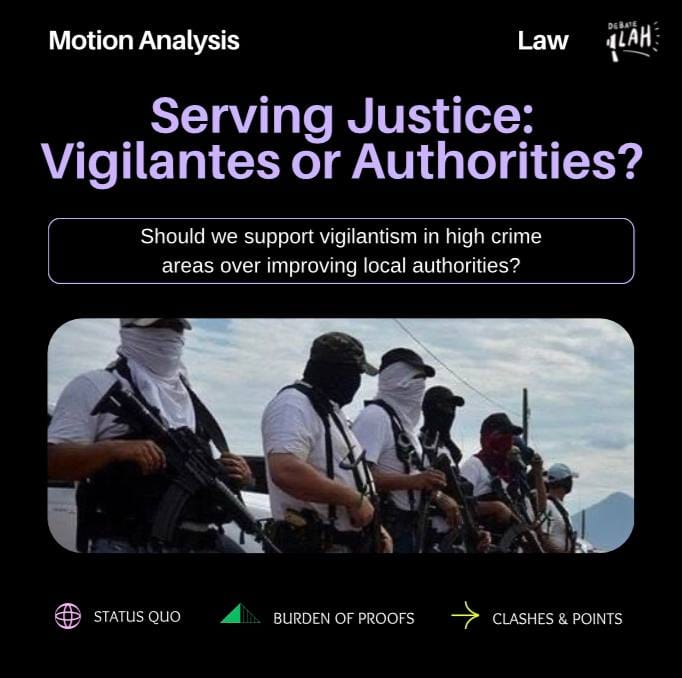Vigilantism
Most of us have dreamt of swinging through big cities like Spiderman and trouncing enemies like Captain America at some point while growing up. All the superheroes you see in Marvel and DC superhero movies are examples of vigilantes – people who take the law into their hands by avenging a crime. People have come to love and grow close to the idea of superheroes saving the day, but whether this would be a practical idea in real life is the question of this debate.
Currently, legal authorities do not take effective action to subdue criminals in high-crime areas. This means the government has failed to protect citizens residing in those areas and serve justice to victims. There is a need for a group of people willing to protect these disenfranchised individuals, and some suggest supporting vigilantism to fill the gap legal authorities have left. Would vigilantism solve problems effectively as how we envision it to go? Or would this mechanism backfire on us, putting these disenfranchised individuals under the governance of power-hungry "rulers"? These questions are answered in the motion:
This house supports vigilantism in high-crime areas
If a vigilante kills a murderer, is he a vigilante or a murderer?
Status Quo: The Need to Take Justice into One's Own Hands
High-crime areas have a significant number of crimes occurring within that particular community. It is likely legal authorities do not enforce the law effectively in these areas due to corruption or lack of manpower, causing crime to thrive without being effectively stopped. This results in a lack of justice being served to citizens and victims of these crimes. Vigilantism would mean a self-appointed group of people undertaking the responsibility of law enforcement.
However, some voice concerns about power abuse by vigilantes. After all, legal authorities were chosen and trained with rules and limitations to what they're allowed to do. That line does not exist for vigilantes who indirectly get to decide what the law is in the areas they enforce law onto. If legal authorities still fail to enforce law fairly and humanely, what more is there to say about the things vigilantes would and could do?
Proponents point out that the ability of governments of high-crime areas and law protection is insufficient in protecting citizens. Areas plagued with cases of mugging, robbery and abductions do not have enough policemen who detest corruption and stand firm against hardened criminals. Therefore, there is a dire need for vigilantism in certain areas.
Opponents suggest improving authorities in high-crime areas instead. They would allow governments to protect their citizens and allow law enforcements to be strengthened without the intervention of vigilantes. When vigilantism is instilled, governments are pushing their burden of protecting citizens back to those citizens when they should be upholding that responsibility.
Mechanisms
Proponents say that vigilantes act as a complement to the police force to lower crime rates and will be under the surveillance of the government. Vigilantes are given legitimization to find criminals and prosecute them. When the crime rate is low, vigilantism is stopped.
Opponents disagree with this as there is no guideline or limitation given by proponents to control the power of vigilantes. Vigilantism can become uncontrolled and harmful to society where vigilantes can commit rapid and extrajudicial killing without being subjected to law, wrongfully convicting a person for a crime they did not do. They also point out extrapolation and dilution of the value of law when giving too much power to vigilantes. Vigilantism also diminishes the power of executive forces, causing people to not trust the police force.
#1 Serving justice
Proponents argue that justice needs to be served. Firstly, there exists an absence of retribution in high-crime areas where criminals are allowed to walk free. Vigilantes would help victims seek retribution and are granted legitimization by the government to bring criminals to prosecution. Besides that, vigilantism would exist as a sense of protection to the people. It is a proper mechanism that can coexist with the current police force to ensure criminals are captured and prosecuted.
They also voice the dire need of vigilantism. They propose the idea of street justice – when there are no policemen at the crime scene, you are given the right to punish the criminal. Moreover, the safety of the people should be the highest law based on the idea of social contract. Governments should protect citizens as it is an agreed obligation and contract between citizens and authorities. When governments fail to fulfil this obligation, you have the right to take care of yourself and be free from prosecution when serving justice at the right times.
Opponents point back to the socially accepted concept of justice. They want to protect people's rights including criminals who have the right to protect themselves in court and undergo fair trials. In proposition's world, vigilantes take matters into their own hands based on their own understanding of justice without following state and country laws. For example, in 1913 at Atlanta, Leo Frank, who had strangled 13-year-old Mary Phagan to death, was kidnapped and lynched by a lynch mob. Opponents of vigilantism stand by the saying, "two wrongs do not make a right", and remind us that vigilantes are likely to serve justice according to their own judgement, which can be clouded and irrational at times. Proponents do not allow a fair justice system because criminals that commit the same crimes do not get equal punishment and justice should be equal across the board instead of being individually interpreted.
#2 Effects on criminals
Proponents argue that vigilantism disincentivizes criminals from committing more crimes. In status quo, there is a lack of fear of criminals towards law enforcers due to corruption. With vigilantism, we can let criminals stop committing crimes out of fear of capture. For example, vigilantism in legalized in Mexico. Thousands of people took up arms with proper regulation from the government. This managed to stop crimes from being committed in high-crime areas as it repelled drug cartels from targeting housing areas and drug pins that weren't caught by policemen before were now captured.
Opponents say that vigilantism harms criminals as vigilantes may take action towards criminals they believe did not receive the punishment they deserve. This clashes with systems like plea bargaining where the convict has an agreement to plead guilty in exchange for a lighter sentence. Vigilantes may seek to harm or kill these convicts out of a desire for revenge. In proposition's world, vigilantes do not ensure safety and fair judgement for criminals. It would also prevent authorities from properly investigating the crime and tackling it.
#3 The obligation of legal authorities
Proponents tells us that vigilantism creates a check and balance in society. Authorities are pushed to improve and solve crimes. Proponents can also create a society that participates in combatting crime and administer justice together with legal authorities as a whole.
Opponents say that governments have the burden to protect the safety of citizens to the best of their abilities. Proponents promote allowing the government to neglect its responsibilities towards citizens. Proponents are also denying responsibility of governments to improve law enforcement and instead give power to people who are not professionals in law enforcement who act upon their own perceptions of right and wrong.
Burden of Proofs
After understanding potential argumentation points from both ends, it’s your turn to evaluate whether each side has provided sufficient proof and analysis to support their stance.
Proponents should prove how vigilantes and authorities can coexist in high-crime areas to protect citizens and lower crime rates.
Opponents should prove that vigilantism is harmful and only allowing the legitimacy of the law within the society can lower crime rates.
Do you think vigilantism is necessary for high-crime areas? Or would it be a hindrance of justice?
Yummy food for thought!
Here's a document that provides a deep analysis of all you need to know about understanding both ends of the topic at hand.
It'll come in handy as reference material when you practice debating!
Also, here's some additional reading material on vigilantism!
- Opinions on vigilantism

Huge thanks to the CFS IIUM debaters for the amazing debate demonstration!
Authors: Sarah (@srhdzl on Instagram), Jacquelyn Hon


